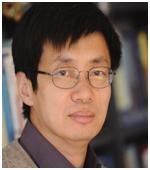
Biography: Xiaodong Wang received the Ph.D degree in Electrical Engineeringfrom Princeton University. He is a Professor of Electrical Engineering at Columbia University in New York. Dr. Wang’s research interests fall in the general areas of signal processing and communications, and has published extensively in these areas. Among his publications is a book entitled “Wireless Communication Systems: Advanced Techniques for Signal Reception”, published by Prentice Hall in 2003. His current research interests include wireless communications, statistical signal processing, and genomic signal processing. Dr. Wang received the 1999 NSF CAREER Award, the 2001 IEEE Communications Society and Information Theory Society Joint Paper Award, and the 2011 IEEE Communication Society Award for Outstanding Paper on New Communication Topics. He has served as an Associate Editor for the IEEE Transactions on Communications, the IEEE Transactions on Wireless Communications, the IEEE Transactions on Signal Processing, and the IEEE Transactions on Information Theory. He is a Fellow of the IEEE and listed as an ISI Highly-cited Author.
Title: Event-driven Decentralized Statistical Signal Processing
Abstract: For many emerging applications that rely on scarce energy resources (e.g., wireless sensor networks, MIMO radar), event-driven sampling, in which a sample is taken when a significant event occurs in the signal, is a promising alternative to the conventional uniform sampling. In these event-based sampling methods, samples are taken based on the signal amplitude instead of time, as apposed to the conventional uniform sampling. As a result, the signal is encoded in the sampling times, whereas in uniform sampling the sample amplitudes encode the signal. This yields a significant advantage in real-time applications, in which sampling times can be tracked via simple one-bit signaling. In this talk, we present the use of event-driven sampling as a means of information transmission for decentralized detection and estimation. We start with the decentralized detection problem where we address the challenge of noisy transmission channels via level-triggered sampling. Then, we discuss the sequential estimation of linear regression parameters under a decentralized setup. Using a variant of level-triggered sampling we design a decentralized estimator that achieves a close-to-optimum average stopping time performance, and linearly scales with the number of parameters while satisfying stringent energy and computation constraints. Finally, we discuss decentralized sequential joint detection and estimation, as well as change detection.
|



